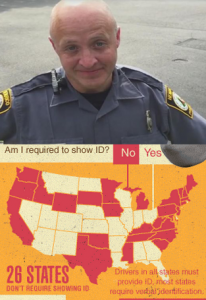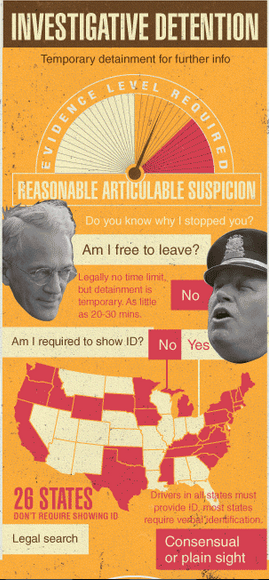
Which of these 4 items is illegal?
- Filming a government building
- Not responding to police officers’ questions
- Not presenting ID to police in Virginia
- Arresting a person for any of the above
If you picked number 4, you’re right. Yet on July 3rd, Kyle David Hammond was arrested in Henrico, Virginia after refusing to speak or show his ID to police officers who took issue with his filming outside an FBI building.
As usual, police apologists commenting online were quick to show their utter ignorance of and complete disdain for basic civil liberties in America and those who exercise them. Virginia is not a “stop and identify” state; Outside of driving a vehicle, you are not required to identify yourself to law enforcement unless you are under arrest.

See the full infographic on your rights when dealing with police at:http://www.online-paralegal-programs.com/legal-rights/
The “papers please” crowd is perfectly OK with Mr. Hammond being arrested for choosing not to speak to police, but what about people who are unable to respond to police questions and commands – people who may have developmental or intellectual disabilities or may be incapacitated by a serious illness? Surely police officers would seek an appropriate peaceful resolution rather than escalating to violent arrest in those situations. Nope. No. Not even close.
Reginald Latson, an 18-year-old special education student, reacted violently one morning in 2010 when he was waiting for the public library in Stafford County to open and a police officer approached.
Responding to a call about a young black man wearing a hoodie, sitting in the grass outside the library and “possibly in possession of a gun,” the officer patted Latson’s pockets, pulled up his hoodie and determined he was unarmed. When Latson refused to provide his name, however, the officer grabbed him with both hands to place him under arrest.
While it would be normal for any person to be confused and alarmed by racial profiling and harassment from law enforcement when they are not breaking any law, it should be noted that Reginald Latson has autism and an IQ of 69. As a result of his disability, he has a fight or flight response when cornered. He reacted violently to the officer’s aggression, beating him, and then running away.
It should also be noted that prior to the assault, which everything indicates was instinctive self-defense in a threatening situation, what grounds did the officer have for an arrest? He had already determined that Reginald was unarmed and was breaking no law by merely sitting on public property. Reginald had no obligation to identify himself. The encounter could have ended peacefully, and both Reginald and the officer could have gone about their business.
Instead, the officer initiated an unlawful arrest, predicating a violent interaction, and Reginald Latson began a tragic journey through the criminal justice system, eventually ending up imprisoned in solitary confinement with his mental condition deteriorating from isolation and lack of treatment. The superintendent of the Winchester jail was even moved to testify on his behalf, urging more humane options for the prisoner he describes as “a boy in a man’s body.”
Reginald Latson received a conditional pardon from Governor Terry McAuliffe earlier this year and was transferred to a residential treatment facility where he is receiving appropriate care. If it hadn’t been for significant public outcry from mental health and disability advocates, he would still be rotting away in prison today.
While the response to horrific cases like Reginald’s is always that police need more training on dealing with the disabled, that misses the point that the default police response to noncompliance is overt aggression; To police there is no difference between refusing to comply and being unable to comply.
The reality is that police need re-training to not be profligate rights violators who choose to escalate situations unnecessarily, and careful screening to weed out the power-tripping dominance freaks who join the force for exactly that reason.



